
USS Dealey (DE-1006), the lead ship of her class of destroyer escort, was a ship of the United States Navy in commission from 1954 to 1972 and named for Commander Samuel D. Dealey (1906–1944), who was awarded the Medal of Honor as commanding officer of the famous World War II submarine USS Harder (SS-257).

USS Hammerberg (DE-1015), a Dealey-class destroyer escort, was a ship of the United States Navy named for Navy diver Francis P. Hammerberg (1920–1945), of Daggett, Michigan, who was awarded the Medal of Honor posthumously for rescuing two fellow divers from a wreck in Pearl Harbor.
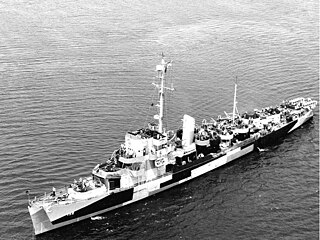
USS Peterson (DE–152) was an Edsall class destroyer escort, the first United States Navy ship so named. This ship was named for Chief Water Tender Oscar V. Peterson (1899–1942), who was awarded the Medal of Honor posthumously for his actions during the Battle of the Coral Sea.

USS Isherwood (DD-520), a Fletcher-class destroyer, was the second ship of the United States Navy to be named for Rear Admiral Benjamin F. Isherwood (1822–1915).

USS Hyman (DD-732), was an Allen M. Sumner-class destroyer of the United States Navy.
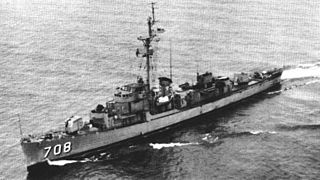
USS Parle (DE-708), a Rudderow-class destroyer escort of the United States Navy, was laid down on 8 January 1944 at the Defoe Shipbuilding Company, in Bay City, Michigan. She was launched on 25 March 1944, sponsored by Mrs. Harry V. Parle, mother of Medal of Honor recipient Ensign John Joseph Parle, and commissioned in New Orleans on 29 July 1944.

USS Frybarger (DE/DEC-705) was a Buckley-class destroyer escort in service with the United States Navy from 1944 to 1947 and from 1950 to 1957. She was scrapped in 1973.
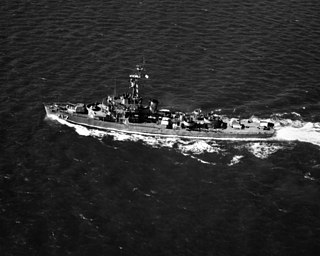
USS Coolbaugh (DE-217) was a Buckley-class destroyer escort in service with the United States Navy from 1943 to 1960. She was scrapped in 1973.

USS Darby (DE-218) was a Buckley-class destroyer escort in service with the United States Navy from 1943 to 1947 and from 1950 to 1968. She was sunk as a target in 1970.

USS John Willis (DE-1027) was a Dealey-class destroyer escort in the United States Navy in service from 1957 to 1972.

USS Huse (DE-145) was a U.S. Navy destroyer escort launched by Consolidated Steel Corp., Orange, Texas on 23 March 1943, during World War II. The ship was sponsored by Mrs. L. M. Humrichouse, daughter of Admiral Harry McLaren Pinckney Huse, whom the ship was named after and commissioned on 30 August 1943.

USS Blair (DE-147) was an Edsall-class destroyer escort in service with the United States Navy from 1943 to 1946 and from 1951 to 1960. She was scrapped in 1974. Blair was named in honor of Chief Machinist's Mate Eugene Blair, who was awarded the Silver Star posthumously for his brave actions when his ship was attacked and bombed by Japanese planes near Port Darwin, Australia, in mid-February 1942.

USS Howard D. Crow (DE-252) was an Edsall-class destroyer escort built for the U.S. Navy during World War II. She served in the Atlantic Ocean the Pacific Ocean and provided destroyer escort protection against submarine and air attack for Navy vessels and convoys.
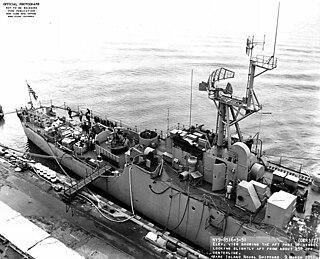
USS Joyce (DE-317) was originally commissioned as a US Coast Guard Edsall-class destroyer escort built for the U.S. Navy during World War II. She served in the Atlantic Ocean and the Pacific Ocean and provided destroyer escort protection against submarine and air attack for Navy vessels and convoys. During its World War II service, on two different engagements with enemy submarines, the Joyce rescued survivors of the tanker SS Pan- Pennsylvania and its sister ship USS Leopold. Joyce received one battle star for its service during World War II.
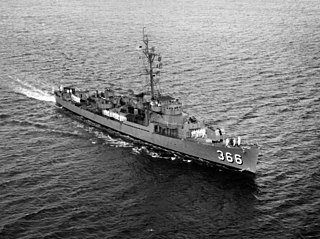
USS Alvin C. Cockrell (DE-366) was a John C. Butler-class destroyer escort in service with the United States Navy from 1944 to 1946 and from 1951 to 1968. She was finally sunk as a target in 1969.

USS Maurice J. Manuel (DE-351) was a John C. Butler-class destroyer escort acquired by the U.S. Navy during World War II. The primary purpose of the destroyer escort was to escort and protect ships in convoy, in addition to other tasks as assigned, such as patrol or radar picket.

USS Woodson (DE-359) was a John C. Butler-class destroyer escort acquired by the United States Navy during World War II. The primary purpose of the destroyer escort was to escort and protect ships in convoy, in addition to other tasks as assigned, such as patrol or radar picket.
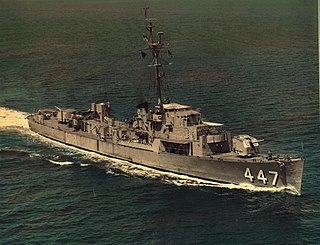
USS Albert T. Harris (DE-447) was a John C. Butler-class destroyer escort acquired by the U.S. Navy during World War II. The primary purpose of the destroyer escort was to escort and protect ships in convoy, in addition to other tasks as assigned, such as patrol or radar picket. Post-war she returned home with two battle stars to her credit.

USS Hollis (DE-794/APD-86) was a Buckley-class destroyer escort in service with the United States Navy from 1944 to 1947 and from 1951 to 1956. She was scrapped in 1975.

USS Greenwood (DE-679) was a Buckley-class destroyer escort in service with the United States Navy from 1943 to 1962. She was scrapped in 1968.




















